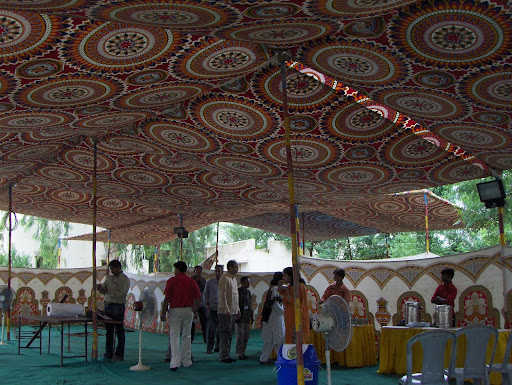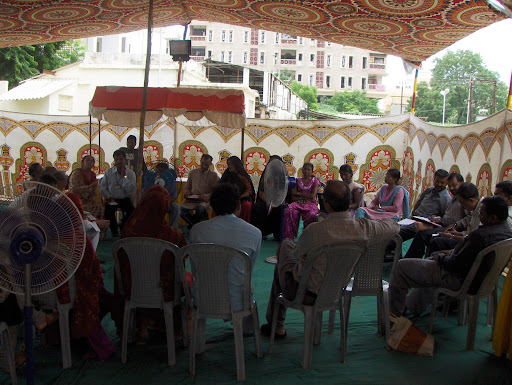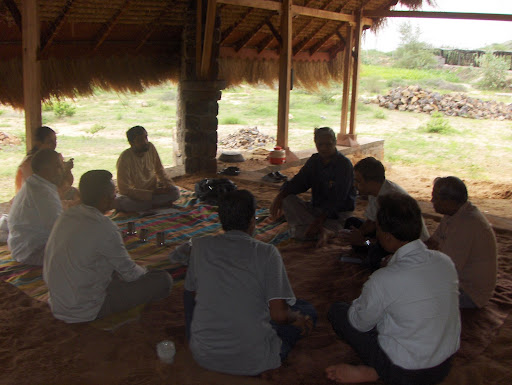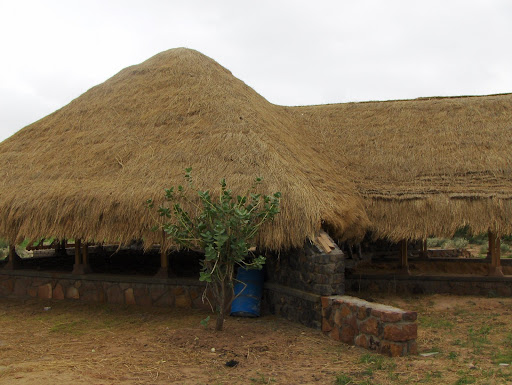 for small producers in Bhuj, in a region of Gujarat called Kuchchh. The conference was great exposure for me as I become more familiar with the type of work going on for small agriculturists in India. More importantly it was a look inside the mentality of active social workers on the ground in India today… what do they see as the main problems for rural poor today? Answer: access (to information, infrastructure, capital), lack of organization and thus bargaining power. Who/what do they consider the “enemies”? Answer: Big business, inept and unsympathetic government. What are the currently accepted and necessary tools for empowerment and mobilization? Answer: cooperatives, government policy that looks after the rural population, ICTs and other infrastructures for connecting rural production to lucrative markets. It was helpful in solidifying in my own mind the types of ideas and models that are prevalent in Indian social work today, so that I can attach appropriate weights to the concepts I have up until now only read in books. In that sense I learned something, as opposed to learning about radically new ideas or models, which I was more hoping to come across but was left in disappointment about.
for small producers in Bhuj, in a region of Gujarat called Kuchchh. The conference was great exposure for me as I become more familiar with the type of work going on for small agriculturists in India. More importantly it was a look inside the mentality of active social workers on the ground in India today… what do they see as the main problems for rural poor today? Answer: access (to information, infrastructure, capital), lack of organization and thus bargaining power. Who/what do they consider the “enemies”? Answer: Big business, inept and unsympathetic government. What are the currently accepted and necessary tools for empowerment and mobilization? Answer: cooperatives, government policy that looks after the rural population, ICTs and other infrastructures for connecting rural production to lucrative markets. It was helpful in solidifying in my own mind the types of ideas and models that are prevalent in Indian social work today, so that I can attach appropriate weights to the concepts I have up until now only read in books. In that sense I learned something, as opposed to learning about radically new ideas or models, which I was more hoping to come across but was left in disappointment about.
I was also able to meet prominent individuals working in rural India today, including NGO leaders, individual activists, academics (including IIM faculty), etc. Unfortunately there didn’t seem to be any other technologists there but me. As I had suspected, playing the Stanford card goes a long way here… I am learning that in India just being a foreigner makes you of higher status… when you then drop name brands it makes you a "sir" with no hesitation, and I am suddenly a peer of tenured academics homegrown in India.
Finally I had the distinct honor of attending a Sajiv Kheti Manch; a semi-regular meeting of about 10 core farmers and agriculturalists who began the organic agriculture movement in Gujarat over 20 years ago. The movement can be said to have originated from Kapilbhai, and then was grown to include this group of old friends who all have taken up farming according to the prescriptions of “living agriculture”, Sajiv Kheti. The meeting was held on Manojbhai’s organic farm outside of Bhuj. It was an absolutely delightful locale.
Sajiv Kheti Manch; a semi-regular meeting of about 10 core farmers and agriculturalists who began the organic agriculture movement in Gujarat over 20 years ago. The movement can be said to have originated from Kapilbhai, and then was grown to include this group of old friends who all have taken up farming according to the prescriptions of “living agriculture”, Sajiv Kheti. The meeting was held on Manojbhai’s organic farm outside of Bhuj. It was an absolutely delightful locale.
Out in the fresh air, with just farmlands in all directions, the environment having a vibrant green and brown color. On top of that we held the meeting in Manojbhai’s newly built favela, an absolutely unique construction with a straw roof, wooden pillars and stone and sound footpath, with a “green wall” in one corner and a “green garden” in the opposite.
green and brown color. On top of that we held the meeting in Manojbhai’s newly built favela, an absolutely unique construction with a straw roof, wooden pillars and stone and sound footpath, with a “green wall” in one corner and a “green garden” in the opposite.
It was seriously one of the coolest things I have ever seen. The meeting began and talks went informally. They generally had the feel of a meeting of venerable elders; they spent much time debating the future of the Sajiv Kheti movement, especially the threats and obstacles, of which they concluded were many. Although Kapilbhai seems to be the leader of the group, everyone spoke and was treated with reverence. Here was a group of giants, I thought, and here I am as a lucky outsider as a fly on the wall to catch their reflections. There was not a trace of arrogance to the way they conducted themselves; they were practical all the way. And it was very clear that they were very close to each other, strong friendships built over personal and common struggle over many years.
Manojbhai has a main farmer who seems to be the one who runs things hands-on. One of my regrets after leaving the farm was not taking enough pictures of both the favela and this farmer (though both are pictured to the right), which I didn’t do out of fear of embarrassing him and myself. He was an awesome sight. If you had to paint a Gujarati farmer, you would paint this guy. Turbaned, deep eyes, dark and thick skin, broad shouldered and thinly clothed. He moved smoothly and had a childish smile. He had his own organic mango farm and shared some of his harvest with us… absolutely divine.
Towards the end of the meeting I had the opportunity to present some of my initial work with Kapilbhai on an organic scorecard, which was received very positively. It was nice to have been able to show the work and feel that I had contributed to the meeting. I felt honored throughout.
After the meeting we went to a local restaurant and had a traditional Gujarati thali dinner, featuring organic vegetables. I was in heaven. There was this absolutely fantastic soya shaak, as well as awesome daal, kadhi, and kichrdi. We also had some fresh mango lassi, courtesy of the restaurant owner, who was the son of Manojbhai’s farmer. My dad often uses the term “Jatt Gujarati” to describe himself, but it’s never really been accurate for our family. But this restaurant owner, the farmer’s son, was the personification of Jatt Gujarati. Like his father, he was well-built and muscular. And he was just massive, one of the biggest and sturdiest-looking Gujarati’s I’ve ever seen. And I could see why: if you had a steady diet of soya shaak and kichdi, I see no reason why you couldn’t have that type of bulk. And all with wimpy vegetables!
This experience with Sajvi Kheti sounds incredible. I'm wishing that I was there with you throughout all of this!
ReplyDelete